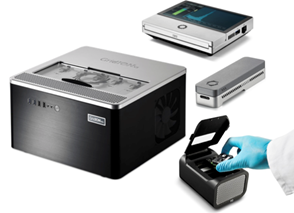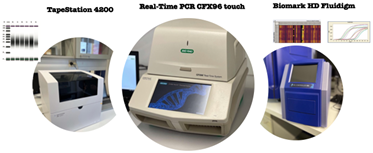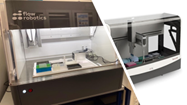Microbial diversity and function in Gut and Food
We investigate microbial behavior in complex environments with particular focus on the mammalian gastrointestinal tract and fermented foods.
Our group aims to understand
- how mammalian gut microbiome associates with health and disease and is influenced by diet, bacteriophages, pre- and probiotics
- how microbes interact with each other and the surrounding food matrix in particularly in plant-based and indigenous fermented foods. To this end, we use approaches ranging from cultivation-based methods to high-throughput sequencing based methods to in vivo and in vitro models. To extract knowledge from these data, we are developing bioinformatic tools and pipelines, and computational methods for data augmentation with adjacent layers of omics data.
- Food fermentations with particular focus on microbe-microbe (e.g. bacteria-fungi) interactions and their influence on flavour, nutrients and structure of fermented (especially plant-based and indigenous) foods
- Gut microbiome characterisation using high throughput Illumina and Oxford Nanopore sequencing platforms
- Bacteriophages and their role in food and the mammalian gastrointestinal tract
- Gut virome characterisation
- The use of bacteriophages and complex viromes for manipulating microbial communities (e.g. in the mammalian gastrointestinal tract)
- Data integration of omics data with production data, health/clinical data etc.
- High-throughput identification of microbes (bacteria, yeast and fungi) as well as anaerobic culturing and characterisation of bacteria, archaea and yeast
- Developing bioinformatic pipelines for Oxford Nanopore long-read sequencing data
- Developing in-house, novel protocols and end-to-end solutions for high-throughput assays using Oxford Nanopore Technologies and Illumina
- In vitro methods for studying food/feed and microbial behavior during gastrointestinal passage and their influence on gut microbial communities
- The use of in vivo models for gnotobiotic studies and microbiome/virome transfer studies
Solid-state fermentations for protein transformations and palatability of plant-based foods.
FOODTOP
First principal models, neural networks and functional graphical models for Defining metabolic capacity as a Tool for Personalized nutrition.
Cassandra
Quality modeling using detailed genomics - coming soon.
ReBoot
Normalizing Gut Microbiome-Brain-communication in Anorexia using Fecal Matter Transplants.
Seaweed-based market applications. Circular economy and bioeconomy sectors program
(HORIZON-CL6-2021-CIRCBIO-01-09).
NO-METHANE
Novel triple action feed additive to reduce enteric methane emission from cattle by blocking the enzymatic process, suppressing methanogens and draining the hydrogen substrate.
PrePhage
Faecal bacteriophage transfer for enhanced gastrointestinal tract maturation in preterm infants.
Preclinical animal models for pre- and probiotic gutbiome stimulation
TrACEr
Time-Aware Constrained Multimodal Data Fusion.
Safe viromes for curing gut-related disease.
The influence of maternal health on human breast milk composition with downstream effects on infant metabolism and gut colonization.
Natural vitamin B12 fortification of future foods by bioprocessing and controlled cell-lysis of Propionibacterium freudenreichii.
ClimateCow
Reducing ruminant methane emission by killing methanogenic archaea with viruses.
Pig Microbiome
Research collaboration with and funded by FermentationExperts.
Early life virome - the hidden player in the development of chronic inflammatory diseases.
RENEW
Valorization of dairy sidestreams to fight calcium deficits in postmenopausal women.
DNAPROKON
Green Development and Growth Programme (GUDP). DNA-based process control for better shelf life and reduced food waste.
PhageGut (Completed)
phages for target specific manipulation of the gut microbiota.
COUNTERSTRIKE (Completed)
Counteracting sarcopenia with proteins and exercise.
NEOMUNE
Early milk and microbiota to stimulate later immunity.
- Oxford Nanopore Technologies sequencing platforms (MinION, MinION Mk1C, GridION, PromethION P2)

- Fluidigm Biomark, FlexSix (12 x 12), 48 x 48, 96 x 96 and 24 x 192
- qPCR Biorad CFX96 touch
- TapeStation (Agilent Technologies 4200)

- Equipment for handling obligate anaerobes and methanogens incl. anaerobic chamber (Don-Whitley) and high-throughput Hungate-based cultivation of obligate anaerobes
- Automated DNA extraction (QIAcube, QIAGEN)
- Equipment for handling methanogens (/hydrogen)
- Small intestine (TSI) and colon (CoMiniGut) in vitro models
- High Performance Computing, customized laboratory solution for real-time analysis of nanopore sequencing data
- Automated handling of high-throughput sequencing (Flowbot one, Biomek 4000)

- Controlled DNA fragmentation (Megaruptor ®2/Bioruptor® - Diagenode)

- Biostat - controlled fermentation systems (Sartorius)
- Beckman Coulter ultracentrifuge
KU-FOODMICRO open source software, workflows and tutorials can be found in GitHub
Tools and tutorials for analysing 16S rRNA gene amplicon sequencing data in Yan Hui's GitHub
Open source tools for various tasks, see Morten Arendt's GitHub
UCPH Chemometrics, our sister group at KU-FOOD chemometrics, has software datasets and tutorials here
2 day course on microbiome seq data handling including data, exercises and curriculum in Morten Arendt's Microbiome Data Analysis GitHub
Contact the research group leader

UCPH FOOD section:
People Involved
Internal members:
| Name | Title | Phone | |
|---|---|---|---|
| Dennis Sandris Nielsen | Professor and Group Leader | +4535333287 | dn@food.ku.dk |
| Morten Arendt Rasmussen | Professor | +4535333197 | mortenr@food.ku.dk |
| Lukasz Krych | Associate Professor | +4535332664 | krych@food.ku.dk |
| Jakob Stokholm | Associate Professor | +4530646465 | stokholm@copsac.com |
| Ling Deng | Associate Professor | +4535330194 | lingdeng@food.ku.dk |
| Kenneth Klingenberg Barfod | Associate Professor | +4535325208 | kenneth.barfod@food.ku.dk |
| Paulina Deptula | Assistant Professor | - | deptula@food.ku.dk |
| Nilay Büdeyri Gökgöz | Assistant Professor | +4535334286 | nilay@food.ku.dk |
Internal members:
| Name | Title | Phone | |
|---|---|---|---|
| Torben Sølbeck Rasmussen | Post Doc | +4535328073 | torben@food.ku.dk |
| Parvaneh Ebrahimi | Postdoc | +4535322328 | |
| Yan Hui | Postdoc | +4550383057 | |
| Göksen Arik | Post Doc | +4550207782 | |
| Xichuan Zhai | PhD Fellow | +4571596934 | |
| Frederik Børger Beck | PhD Fellow | - | |
| Rasmus Riemer Jakobsen | PhD Fellow | - | |
| Xiaotian Mao | PhD Fellow | +4535334659 | |
| Zhuqing Xie | PhD Fellow | +4535332400 | |
| Yichang Zhang | PhD Fellow | - | |
| Frida Cecilie Jensen | PhD Fellow | +4535337397 | |
| Frej Andreas Nøhr Larsen | PhD Fellow | +4535337299 | |
| Tessa Suzanne Canoy | PhD fellow | - |
tessa@food.ku.dk |
| Anne Kristine Schack | PhD Fellow | +4535333748 | |
| Getnet Tesfaw Tadege | PhD Fellow | - | |
| David Lyle George Horner | PhD Fellow | +4535321614 | |
| Sarah Brandt | PhD Fellow | +4535324636 | |
| Zhi Ye | PhD Fellow | +4535322761 | |
| Zhoubing Peng | PhD Fellow | +4535325886 |
Internal members:
| Name | Title | Phone | |
|---|---|---|---|
| Susann Romy Gröbner | Research assistant | +4535326082 | susann.groebner@food.ku.dk |
| Pablo Atienza Lopez | Research assistant | +4535329967 | pablo.lopez@food.ku.dk |
| Kaare Dyekær Tranæs | Research assistant | - | cxb592@alumni.ku.dk |
| Denitsa Vladimirova Stefanova | Laboratory technician | +4535326540 | denitsa@food.ku.dk |
| Marina Kryger Bjørklund | Laboratory technician | +4535336724 | mhan@food.ku.dk |
| Bashir Aideh | Laboratory technician | +4535336722 | bai@food.ku.dk |
| Emilie Gaal | Laboratory technician | +4528642266 | eg@food.ku.dk |
| Pernille Lærke Jensen | Laboratory technician | +4535324634 | pernille.l.jensen@food.ku.dk |
| Linda Henny Køhler Ravn Hansen | Laboratory technician trainee | - | lh@food.ku.dk |
| Emma Kalindi Holtveg-Glass | Laboratory technician trainee | +4535327530 | ekhg@food.ku.dk |
External members:
| Name | Title | Phone | |
|---|---|---|---|
| Gözde Gürdeniz | Post Doc | - | gozde.gurdeniz@dbac.dk |
